人教版(2019)选择性必修第一册Unit 1 People of Achievement Discover useful structures 课件(共42张PPT)
文档属性
| 名称 | 人教版(2019)选择性必修第一册Unit 1 People of Achievement Discover useful structures 课件(共42张PPT) |
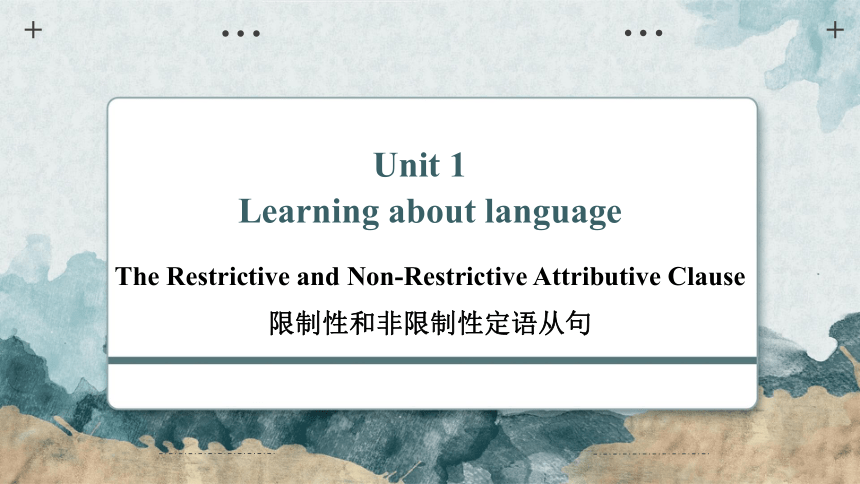
|
|
| 格式 | pptx | ||
| 文件大小 | 7.0MB | ||
| 资源类型 | 教案 | ||
| 版本资源 | 人教版(2019) | ||
| 科目 | 英语 | ||
| 更新时间 | 2024-01-12 00:00:00 | ||
图片预览


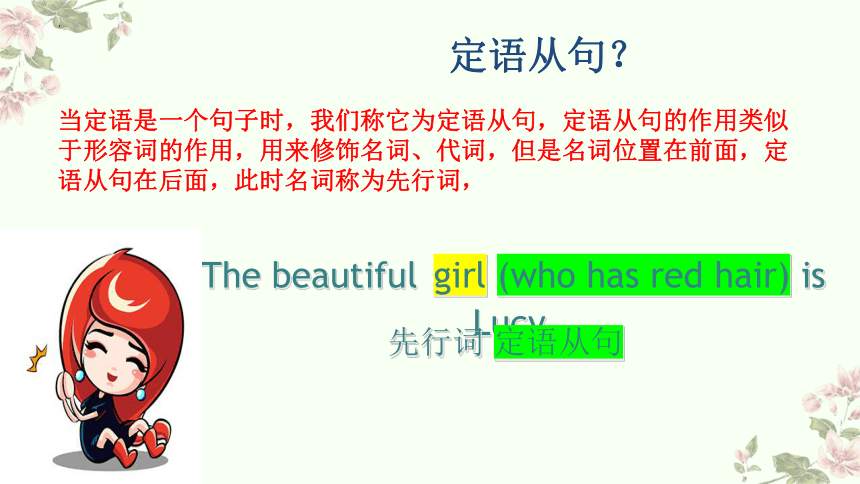
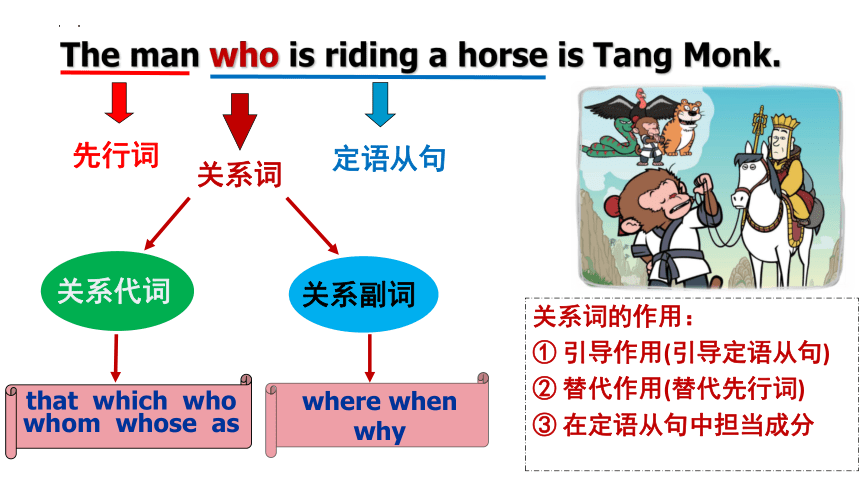
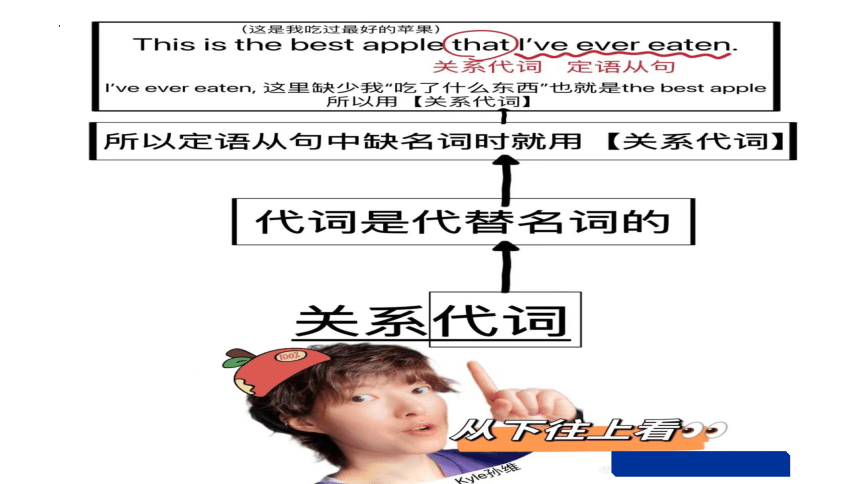

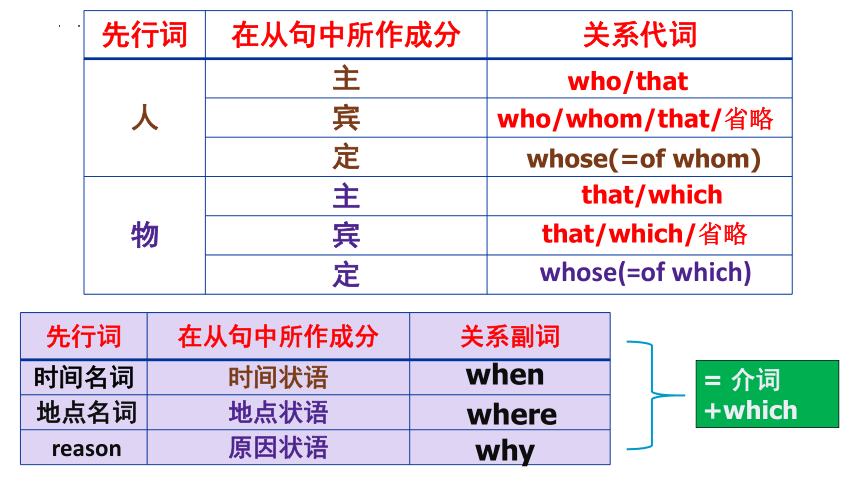
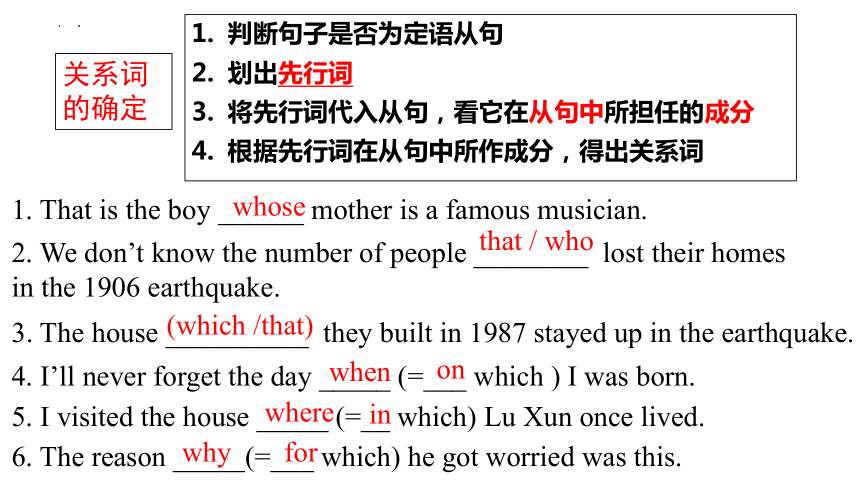
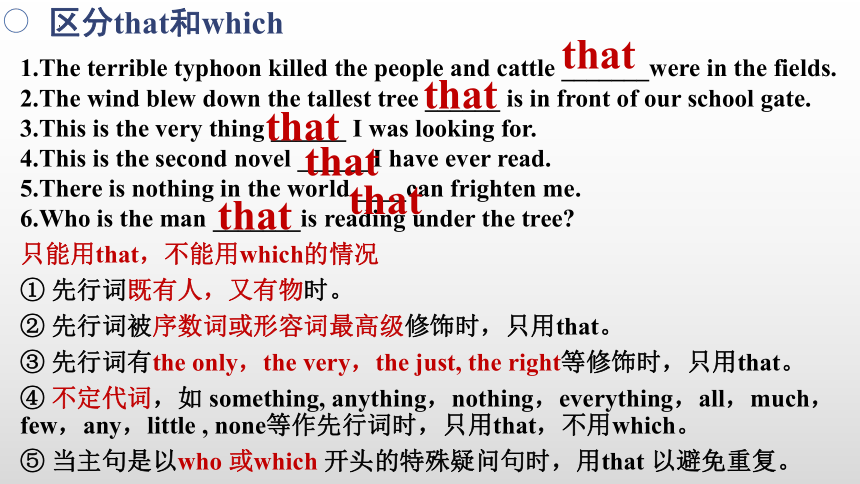
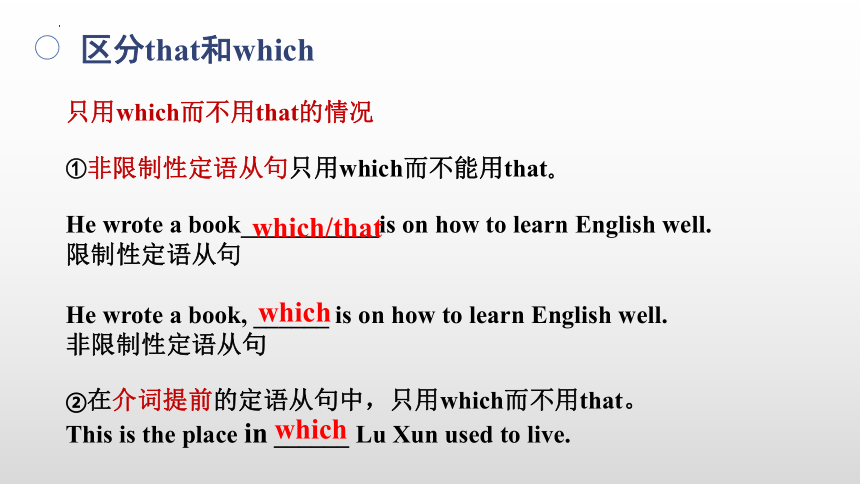
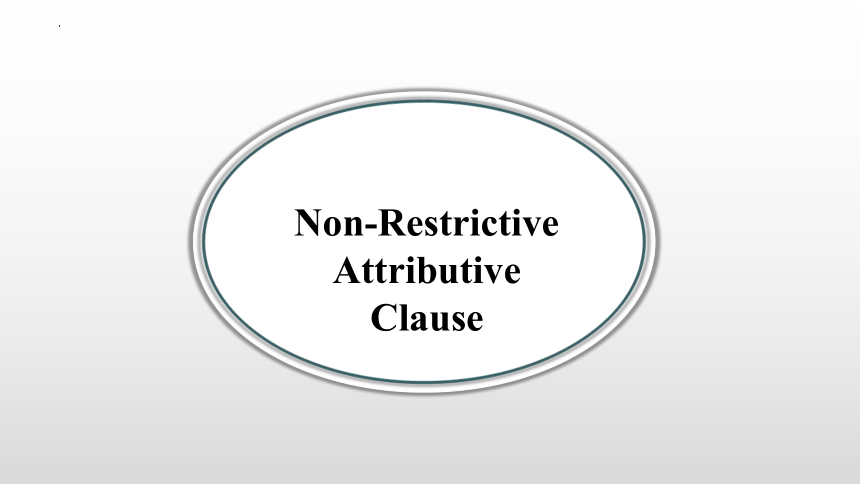
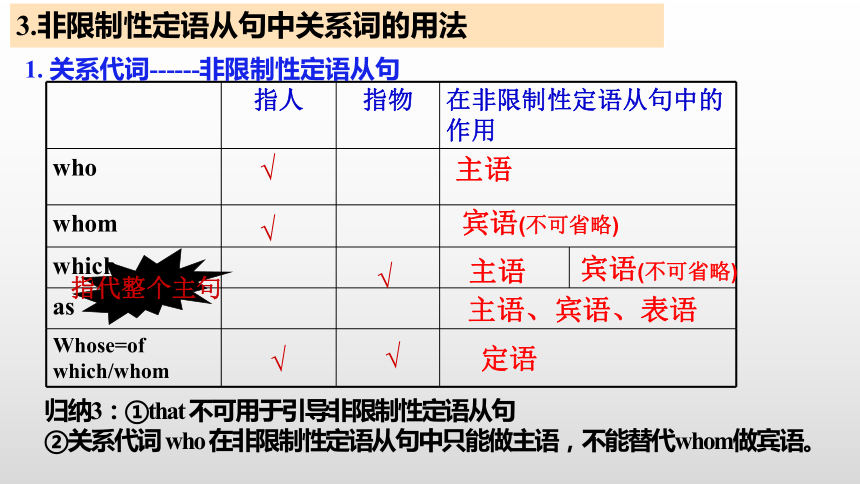
文档简介
(共42张PPT)
Learning about language
Unit 1
The Restrictive and Non-Restrictive Attributive Clause
限制性和非限制性定语从句
Review:
a beautiful girl
在这里,beautiful是一个形容词,形容词来修饰名词、代词,做定语。
当定语是一个句子时,我们称它为定语从句,定语从句的作用类似于形容词的作用,用来修饰名词、代词,但是名词位置在前面,定语从句在后面,此时名词称为先行词.
定语?
当定语是一个句子时,我们称它为定语从句,定语从句的作用类似于形容词的作用,用来修饰名词、代词,但是名词位置在前面,定语从句在后面,此时名词称为先行词,
定语从句?
The beautiful girl (who has red hair) is Lucy.
先行词 定语从句
The man who is riding a horse is Tang Monk.
先行词
关系词
定语从句
who
关系代词
关系副词
that which who whom whose as
where when why
关系词的作用:
① 引导作用(引导定语从句)
② 替代作用(替代先行词)
③ 在定语从句中担当成分
先行词 在从句中所作成分 关系代词
人 主
宾
定
物 主
宾
定
先行词 在从句中所作成分 关系副词
时间名词 时间状语
地点名词 地点状语
reason 原因状语
who/that
who/whom/that/省略
whose(=of whom)
that/which
that/which/省略
whose(=of which)
why
when
where
= 介词+which
判断句子是否为定语从句
划出先行词
将先行词代入从句,看它在从句中所担任的成分
根据先行词在从句中所作成分,得出关系词
关系词
的确定
1. That is the boy ______ mother is a famous musician.
3. The house __________ they built in 1987 stayed up in the earthquake.
2. We don’t know the number of people ________ lost their homes in the 1906 earthquake.
that / who
(which /that)
whose
4. I’ll never forget the day _____ (=___ which ) I was born.
5. I visited the house _____ (=__ which) Lu Xun once lived.
6. The reason _____(=___ which) he got worried was this.
when
on
where
in
why
for
区分that和which
1.The terrible typhoon killed the people and cattle _______were in the fields.
2.The wind blew down the tallest tree ______ is in front of our school gate.
3.This is the very thing ______ I was looking for.
4.This is the second novel ______I have ever read.
5.There is nothing in the world ____can frighten me.
6.Who is the man _______is reading under the tree
that
that
that
that
that
that
只能用that,不能用which的情况
① 先行词既有人,又有物时。
② 先行词被序数词或形容词最高级修饰时,只用that。
③ 先行词有the only,the very,the just, the right等修饰时,只用that。
④ 不定代词,如 something, anything,nothing,everything,all,much,few,any,little , none等作先行词时,只用that,不用which。
⑤ 当主句是以who 或which 开头的特殊疑问句时,用that 以避免重复。
区分that和which
只用which而不用that的情况
①非限制性定语从句只用which而不能用that。
He wrote a book___________is on how to learn English well.
限制性定语从句
He wrote a book, ______ is on how to learn English well.
非限制性定语从句
②在介词提前的定语从句中,只用which而不用that。
This is the place in ______ Lu Xun used to live.
which/that
which
which
Non-Restrictive
Attributive Clause
指人 指物 在非限制性定语从句中的作用
who
whom
which
as
Whose=of which/whom
√
主语
√
宾语(不可省略)
指代整个主句
√
主语
宾语(不可省略)
√
√
定语
3.非限制性定语从句中关系词的用法
归纳3:①that 不可用于引导非限制性定语从句
②关系代词 who 在非限制性定语从句中只能做主语,不能替代whom做宾语。
1. 关系代词------非限制性定语从句
主语、宾语、表语
2. 关系副词-----非限制性定语从句
(1) 关系副词 when 在非限制性定语从句中作时间状语, 指
代主句中表示________的词语。
(2)关系副词 where 在非限制性定语从句中作地点状语, 指代
主句中表示________的词语。
(3) when / where 有时可以换成“介词十 which”。
(4)不能用why 引导非限制性定语从句,要用 ___________ 代替。
时间
地点
for which
2.2如何确定关系代词前的介词?
1.与先行词的搭配关系
1) I will never forget the day ____which I joined the army.
2) I will never forget the year ___which my son went to college.
3) I will never forget the school ______which I studied.
4)He came to a farm, _____which he finally settled (安顿).
on
in
in
on
关系副词
2. 与从句中谓语动词、形容词的搭配的固定搭配
1)Have you found the book _____which I paid $29
Have you found the book ______which I spent $29
Do you know the man _____whom she often talks
The West Lake, _____ which Hangzhou is famous, is a beautiful place.
for
on
about
for
1) Air, _______ which man can’t live, is really important.
空气非常重要,没有了它人类便不能生存。
2) This is the man _______ whom my brother has worked for ten years.
这就是和我弟弟一起工作了十年的那个人。
without
with
3. 根据句子的意思来确定
关系副词
3.关系代词和关系副词的区别
1.I’ll never forget the days______ we worked together.
2.I’ll never forget the days _______ we spent together.
3.I went to the place______ I worked ten years ago.
4.I went to the place ______________ I visited ten years ago.
5.This is the reason ________ he was late.
6.This is the reason __________________ he gave.
when
(which)
where
(which/that)
why
(which/that)
要看先行词是人还是物
要看先行词在从句中所担任的成分
先行词不会在从句中出现,包括其指代
当先行词在从句中做宾语时,关系词可以省略
关系词
的确定
【语境应用】完成句子。
1) The foreign guests, ________ (who / that) were scientists, were warmly welcomed at the airport.
2) My father bought me several books, none of ________ (which / that) I like to read.
3) Is there anyone in your class ________ (which / whose) family is in the city
4) Football, ________ (which / that) is a very interesting game, is played all over the world.
who
which
whose
which
5) The students went to the hospital to see Miss Zhang, ________ (that / whom/who) they respect greatly.
6) They went to the Royal Theatre, ________ (which / where) they saw the great show.
7) The weather turned out to be very good, ________ (which / that) was more than I had expected.
8) There are 50 students in our class, half of ________ (whom / who) are girls.
whom
where
which
whom
As everyone knows, China is a country with a long history.
She is a great hero, as is described in the report.
He invited me to dinner, which made me very happy.
This novel, which I have read three times, is very touching.
归纳 3:
as和which在引导非限制性定语从句时可代替整个主句。
as和which引导非限制性定语从句时的位置不同:
as引导的定语从句可置于___________________,而which引导的非限制性定语从句不可放在_______________________________。
(3) as引导的定语从句有“__________的意思,而which指“_________”
句首、句中、句后
句首,只能放在句中、句后
3.非限制性定从句中关系词as和which的区别
正如…….
这…….
3.Difference between “as” and “which” in a sentence.
项目 as which
指代 引导从句只能指代整个主句的内容 引导从句既可指代整个主句的内容,也可指代主句的一部分
位置 引导从句可位于主句之 前、之中或之后 引导从句只能位于主句之后
意义 正如;正像 这一点;这件事
功能 连接上下文,表达说话人的观点、看法,并指出主句内容的根据或出处等 引导的从句在意义上相当于一个并列句
As everyone knows, China is the largest developing country in the world.
2. He forgot to bring his pen with him yesterday, as we expected.
3. He said that he had never seen him before, which was obviously not true.
4. He changed his mind, which made me quite angry.
as引导非限制性定语从句,译为“ ”。
常置于 ,也可置于句中。
正如,就像
句首
which引导非限制性定语从句,常指代前面整个句子,
只能放在先行词 翻译成 。
这
翻译句子 比较as/which引导非限制性定语从句的用法
正如每个人都知道的,中国是最大的发展中国家。
他昨天忘带笔了,正如我们预料的那样。
他说他以前没有见过他,这明显不是真的
他改变了主意,这让我很生气。
后
as 常见搭配
as is known to all;
as you know
as is expected
as we expected
as has been mentioned above
as is reported / said
as a famous saying goes
as is pointed out
as you can see = as can be seen
as is often the case
众所周知
正如你所知道的那样
正如所预料的那样
正如我们所期待的
正如上面所提到的
正如报道/所说的那样
正如一句谚语所说/俗话说
正如指出的
正如你所看见的
情况通常如此
定语从句就其与先行词的关系可分为限制性定语从句和非限制性定语从句。
non-restrictive relative clauses
一、形式不同
限制性定语从句与其先行词关系密切,其间通常不用逗号隔
开,非限制性定语从句与其先行词关系不密切,常用逗号隔
开。如:
She hates people who like smoking.
My hometown is Beijing, which is the capital of China.
如:
She hates people who like smoking.
My hometown is Beijing, which is the capital of China.
非限制性定语从句是对先行词的附加说明,去掉之后,意思明确,与主句通常用 “,”隔开,把非限制性定语从句放在句子中,其前后都需要用逗号隔开。
限制性定语从句是先行词不可缺少的部分,去掉之后,主句意思不明确。
先行词不唯一,缩小范围,限定。
先行词唯一,没必要限定,为附加说明。
二、作用不同
三、先行词不同
限制性定语从句的先行词一般是名词或代词,非限制性定语从句的先行词既可以是名词或代词, 也可以是主句的一部分或整个主句。如:
I have a dog,which is black. (先行词为dog )
Chinese is very important, which means you have to learn it well. (先行词为整个主句)
限制性定从
关代: that, which, who, whom, as
关副: when, where,why
=介词+which
关形: whose
= of which, of whom
________________________
非限制性定从
关代: that, which, who, whom, as
关副: when, where, why
=介词+which
关形: whose
= of which, of whom
for which
四、关系词不同
限制性定语从句 非限制性定语从句
形式上
意义上
作用上
翻译上
关系词
无逗号
有逗号
去掉从句,主句意思不完整不明确
去掉从句,主句意思仍然完整清楚
修饰限定
只修饰一个名词或代词
补充说明
可修饰一个词,也可修饰整个句子
译为“……的”
常译成与主句并列的句子
作宾语时可省略
关系词一般不可省略
不能用that, why引导
The differences
Summary
三、使用非限制性定语从句时的注意事项
1. that不能引导非限制性定语从句。
在非限制性定语从句中, 用who, whom指代人, 用which 指代物。
She was very fond of speaking French, which indeed she spoke well.
I had told them the reason, for which I didn’t attend the meeting.
2. 非限制性定语从句表原因时, 不能用why引导, 而用for which代替why。
三、使用非限制性定语从句时的注意事项
They went to London, where they lived for six months.
3. 当先行词是世界上独一无二的事物或专有名词时, 其后的定语从句通常是非限制性定语从句。
4. 当先行词是唯一亲属, 使用非限制性定语从句。
Professor Wang has a son, who works in Beijing.
三、使用非限制性定语从句时的注意事项
5. 当先行词指代整个主句内容时, 使用非限制性定语从句。
He said that he had never seen her before, which was not true.
6. most/each/few/some/any/none/both/all/neither/分数/百分数/数字 + of + which/whom
Later, the medicine was tested on malaria patients, most of whom recovered.
non-restrictive attributive clause
小试牛刀篇
小试牛刀
non-restrictive attributive clause
Underline the attributive clauses and name the two types of clauses
1. They tested hundreds of Chinese medical treatments that showed promise in the fight against the disease.
2. Tu Youyou was awarded the Nobel Prize, which is considered one of the highest international honours a person can receive.
3. Tu Youyou went to Hainan, where malaria was more common, to study malaria patients.
4. Later, the medicine was tested on malaria patients, most of whom recovered.
Restrictive
Attributive Clause
Non-Restrictive Attributive Clause
1
2 3 4
Rewrite the sentences using non-restrictive relative clause. How do the sentences flow differently
1 We were very impressed by the old man. He was not willing to acknowledge defeat.
2 Afterwards, Einstein had to flee Germany. Hitler was in power there.
3 There is nothing we can do to help Linda. Her circumstances are beyond our control.
We were very impressed by the old man, who was not willing to acknowledge defeat.
Afterwards, Einstein had to flee Germany, where Hitler was in power.
There is nothing we can do to help Linda, whose circumstances are beyond our control.
4 The teacher asked us to listen to a speech by his favourite novelist, J.K. Rowling. It inspired us a lot.
5 The building under construction was designed by I.M. Pei — a famous Chinese American architect. He was born in Guangzhou, China.
6 I was asked to explain the project with the help of a flow chart. It was a big challenge for me.
The teacher asked us to listen to a speech by his favourite novelist, J. K. Rowling, which inspired us a lot.
The building under construction was designed by I. M. Pei — a famous Chinese American architect, who was born in Guangzhou, China.
I was asked to explain the project with the help of a flow chart, which was a big challenge for me.
In each case, there are two short sentences which sound separate to each other. By combining the two simple sentences together using non-restrictive relative clause, the sentence becomes more varied and has better flow.
Conclusion
Work in plete the sentences using non-restrictive relative clause to give extra information. Then share them with your group member.
EXAMPLE
I’d like to try …, …
I’d like to try that Chinese herbal medicine again, which seems to work best for my cough.
1 I would like to travel around …, …
2 What impressed me most …, …
3 My favourite scientist is …, …
I would like to travel around Sichuan Province, where Jiuzhaigou locates.
What impressed me most about the film was the ending, which was quite moving.
My favourite scientist is Nikola Tesla, who was quite brilliant but also had some crazy ideas.
4 Finally we arrived at …, …
5 My grandparents like …, …
6 I wish to obtain …, …
7 My best friend …, …
Finally we arrived at the zoo, which was closed for repairs.
My grandparents like going for outings in spring, which is good for their health.
I wish to obtain a driving licence, which is necessary if you want to drive a car.
My best friend came to visit last week, which was the first time I had seen him in years.
1. (2019·浙江卷·语法填空)On the edge of the jacket, there is a piece of cloth _____________ gives off light in the dark.
2. (2019·北京卷·语法填空)The students benefiting most from college are those __________are totally engaged(参与)in academic life.
3. (2018·全国I)Two of the authors of the review also made a study published in 2014 ________ showed a mere five to 10 minutes a day of running reduced the risk of heart disease and early deaths from all causes.
4. (2018·全国II)The Chinese Ministry of Agriculture finds that between 2005—when the government started a soil-testing program___________ gives specific fertilizer recommendations to farmers - and 2011, fertilizer use dropped by 7.7 million tons.
高考链接
that/which
who
that/which
which/that
5. (2015·江苏,21)The number of smokers, ________is reported, has dropped by 17 percent in just one year.
6. (2015·湖南,29)It is a truly delightful place, ________looks the same as it must have done 100 years ago with its winding streets and pretty cottages.
7. (2015·浙江,19)Creating an atmosphere in ________employees feel part of a team is a big challenge.
8. (2015·四川,3)The books on the desk,________ covers are shiny,are prizes for us.
as
which
whose
which
1. By boat is the only way to get here, ______ is how we arrived.
2. ____ he writes in his new book , A Long Way Home , Brierley couldn’t help but wonder about his hometown back in India .
3. I borrowed the book Sherlock Holmes from the library last week , _________ my classmates recommend to me.
4. The number of smokers , _______is reported , has dropped by 17 percent in just one year .
5. Until now, we have raised 5000 pounds for the poor children,
________ is quite unexpected.
6. I had told them the reason, _________ I didn’t attend the meeting.
which
As
which
as
which
that 和 why 不可引导非限制性定语从句。
for which
Task 1
7. The growing speed of a plant is influenced by a number of factors, most of are beyond our control.
8. The Science Museum, we visited during a recent trip to Britain, is one of London’s tourist attractions.
9.This is Tom, with I went to the library yesterday.
10. This is Tom, from father I learned a lot.
11.left on Sunday, everyone was at home.
12.Opposite is St. Paul’s Church, you can hear some lovely music .
which
which
whom
whose
when/on which
where/in which
Task 2
1. These apple trees have not produced any fruits. I planted them three years ago.
__________________________________________________________
.
2. The lazy boy got the highest score in the test. It surprised me.
___________________________________________________________
3. The students in our class want to improve their Maths.
Many of them are not bad at Maths.
______________________________________________________
______________________________________________________
4. The school has a history of 117 years. I studied for 6 years there.
.
将两个句子合并成非限制性定语从句
These apple trees, which I planted three years ago, have not produced any fruits.
The lazy boy got the highest score in the test, which surprised me.
The students in our class, many of whom are not bad at Maths, want to improve their Maths.
The school, where I studied for 6 years, has a history of 117 years.
Learning about language
Unit 1
The Restrictive and Non-Restrictive Attributive Clause
限制性和非限制性定语从句
Review:
a beautiful girl
在这里,beautiful是一个形容词,形容词来修饰名词、代词,做定语。
当定语是一个句子时,我们称它为定语从句,定语从句的作用类似于形容词的作用,用来修饰名词、代词,但是名词位置在前面,定语从句在后面,此时名词称为先行词.
定语?
当定语是一个句子时,我们称它为定语从句,定语从句的作用类似于形容词的作用,用来修饰名词、代词,但是名词位置在前面,定语从句在后面,此时名词称为先行词,
定语从句?
The beautiful girl (who has red hair) is Lucy.
先行词 定语从句
The man who is riding a horse is Tang Monk.
先行词
关系词
定语从句
who
关系代词
关系副词
that which who whom whose as
where when why
关系词的作用:
① 引导作用(引导定语从句)
② 替代作用(替代先行词)
③ 在定语从句中担当成分
先行词 在从句中所作成分 关系代词
人 主
宾
定
物 主
宾
定
先行词 在从句中所作成分 关系副词
时间名词 时间状语
地点名词 地点状语
reason 原因状语
who/that
who/whom/that/省略
whose(=of whom)
that/which
that/which/省略
whose(=of which)
why
when
where
= 介词+which
判断句子是否为定语从句
划出先行词
将先行词代入从句,看它在从句中所担任的成分
根据先行词在从句中所作成分,得出关系词
关系词
的确定
1. That is the boy ______ mother is a famous musician.
3. The house __________ they built in 1987 stayed up in the earthquake.
2. We don’t know the number of people ________ lost their homes in the 1906 earthquake.
that / who
(which /that)
whose
4. I’ll never forget the day _____ (=___ which ) I was born.
5. I visited the house _____ (=__ which) Lu Xun once lived.
6. The reason _____(=___ which) he got worried was this.
when
on
where
in
why
for
区分that和which
1.The terrible typhoon killed the people and cattle _______were in the fields.
2.The wind blew down the tallest tree ______ is in front of our school gate.
3.This is the very thing ______ I was looking for.
4.This is the second novel ______I have ever read.
5.There is nothing in the world ____can frighten me.
6.Who is the man _______is reading under the tree
that
that
that
that
that
that
只能用that,不能用which的情况
① 先行词既有人,又有物时。
② 先行词被序数词或形容词最高级修饰时,只用that。
③ 先行词有the only,the very,the just, the right等修饰时,只用that。
④ 不定代词,如 something, anything,nothing,everything,all,much,few,any,little , none等作先行词时,只用that,不用which。
⑤ 当主句是以who 或which 开头的特殊疑问句时,用that 以避免重复。
区分that和which
只用which而不用that的情况
①非限制性定语从句只用which而不能用that。
He wrote a book___________is on how to learn English well.
限制性定语从句
He wrote a book, ______ is on how to learn English well.
非限制性定语从句
②在介词提前的定语从句中,只用which而不用that。
This is the place in ______ Lu Xun used to live.
which/that
which
which
Non-Restrictive
Attributive Clause
指人 指物 在非限制性定语从句中的作用
who
whom
which
as
Whose=of which/whom
√
主语
√
宾语(不可省略)
指代整个主句
√
主语
宾语(不可省略)
√
√
定语
3.非限制性定语从句中关系词的用法
归纳3:①that 不可用于引导非限制性定语从句
②关系代词 who 在非限制性定语从句中只能做主语,不能替代whom做宾语。
1. 关系代词------非限制性定语从句
主语、宾语、表语
2. 关系副词-----非限制性定语从句
(1) 关系副词 when 在非限制性定语从句中作时间状语, 指
代主句中表示________的词语。
(2)关系副词 where 在非限制性定语从句中作地点状语, 指代
主句中表示________的词语。
(3) when / where 有时可以换成“介词十 which”。
(4)不能用why 引导非限制性定语从句,要用 ___________ 代替。
时间
地点
for which
2.2如何确定关系代词前的介词?
1.与先行词的搭配关系
1) I will never forget the day ____which I joined the army.
2) I will never forget the year ___which my son went to college.
3) I will never forget the school ______which I studied.
4)He came to a farm, _____which he finally settled (安顿).
on
in
in
on
关系副词
2. 与从句中谓语动词、形容词的搭配的固定搭配
1)Have you found the book _____which I paid $29
Have you found the book ______which I spent $29
Do you know the man _____whom she often talks
The West Lake, _____ which Hangzhou is famous, is a beautiful place.
for
on
about
for
1) Air, _______ which man can’t live, is really important.
空气非常重要,没有了它人类便不能生存。
2) This is the man _______ whom my brother has worked for ten years.
这就是和我弟弟一起工作了十年的那个人。
without
with
3. 根据句子的意思来确定
关系副词
3.关系代词和关系副词的区别
1.I’ll never forget the days______ we worked together.
2.I’ll never forget the days _______ we spent together.
3.I went to the place______ I worked ten years ago.
4.I went to the place ______________ I visited ten years ago.
5.This is the reason ________ he was late.
6.This is the reason __________________ he gave.
when
(which)
where
(which/that)
why
(which/that)
要看先行词是人还是物
要看先行词在从句中所担任的成分
先行词不会在从句中出现,包括其指代
当先行词在从句中做宾语时,关系词可以省略
关系词
的确定
【语境应用】完成句子。
1) The foreign guests, ________ (who / that) were scientists, were warmly welcomed at the airport.
2) My father bought me several books, none of ________ (which / that) I like to read.
3) Is there anyone in your class ________ (which / whose) family is in the city
4) Football, ________ (which / that) is a very interesting game, is played all over the world.
who
which
whose
which
5) The students went to the hospital to see Miss Zhang, ________ (that / whom/who) they respect greatly.
6) They went to the Royal Theatre, ________ (which / where) they saw the great show.
7) The weather turned out to be very good, ________ (which / that) was more than I had expected.
8) There are 50 students in our class, half of ________ (whom / who) are girls.
whom
where
which
whom
As everyone knows, China is a country with a long history.
She is a great hero, as is described in the report.
He invited me to dinner, which made me very happy.
This novel, which I have read three times, is very touching.
归纳 3:
as和which在引导非限制性定语从句时可代替整个主句。
as和which引导非限制性定语从句时的位置不同:
as引导的定语从句可置于___________________,而which引导的非限制性定语从句不可放在_______________________________。
(3) as引导的定语从句有“__________的意思,而which指“_________”
句首、句中、句后
句首,只能放在句中、句后
3.非限制性定从句中关系词as和which的区别
正如…….
这…….
3.Difference between “as” and “which” in a sentence.
项目 as which
指代 引导从句只能指代整个主句的内容 引导从句既可指代整个主句的内容,也可指代主句的一部分
位置 引导从句可位于主句之 前、之中或之后 引导从句只能位于主句之后
意义 正如;正像 这一点;这件事
功能 连接上下文,表达说话人的观点、看法,并指出主句内容的根据或出处等 引导的从句在意义上相当于一个并列句
As everyone knows, China is the largest developing country in the world.
2. He forgot to bring his pen with him yesterday, as we expected.
3. He said that he had never seen him before, which was obviously not true.
4. He changed his mind, which made me quite angry.
as引导非限制性定语从句,译为“ ”。
常置于 ,也可置于句中。
正如,就像
句首
which引导非限制性定语从句,常指代前面整个句子,
只能放在先行词 翻译成 。
这
翻译句子 比较as/which引导非限制性定语从句的用法
正如每个人都知道的,中国是最大的发展中国家。
他昨天忘带笔了,正如我们预料的那样。
他说他以前没有见过他,这明显不是真的
他改变了主意,这让我很生气。
后
as 常见搭配
as is known to all;
as you know
as is expected
as we expected
as has been mentioned above
as is reported / said
as a famous saying goes
as is pointed out
as you can see = as can be seen
as is often the case
众所周知
正如你所知道的那样
正如所预料的那样
正如我们所期待的
正如上面所提到的
正如报道/所说的那样
正如一句谚语所说/俗话说
正如指出的
正如你所看见的
情况通常如此
定语从句就其与先行词的关系可分为限制性定语从句和非限制性定语从句。
non-restrictive relative clauses
一、形式不同
限制性定语从句与其先行词关系密切,其间通常不用逗号隔
开,非限制性定语从句与其先行词关系不密切,常用逗号隔
开。如:
She hates people who like smoking.
My hometown is Beijing, which is the capital of China.
如:
She hates people who like smoking.
My hometown is Beijing, which is the capital of China.
非限制性定语从句是对先行词的附加说明,去掉之后,意思明确,与主句通常用 “,”隔开,把非限制性定语从句放在句子中,其前后都需要用逗号隔开。
限制性定语从句是先行词不可缺少的部分,去掉之后,主句意思不明确。
先行词不唯一,缩小范围,限定。
先行词唯一,没必要限定,为附加说明。
二、作用不同
三、先行词不同
限制性定语从句的先行词一般是名词或代词,非限制性定语从句的先行词既可以是名词或代词, 也可以是主句的一部分或整个主句。如:
I have a dog,which is black. (先行词为dog )
Chinese is very important, which means you have to learn it well. (先行词为整个主句)
限制性定从
关代: that, which, who, whom, as
关副: when, where,why
=介词+which
关形: whose
= of which, of whom
________________________
非限制性定从
关代: that, which, who, whom, as
关副: when, where, why
=介词+which
关形: whose
= of which, of whom
for which
四、关系词不同
限制性定语从句 非限制性定语从句
形式上
意义上
作用上
翻译上
关系词
无逗号
有逗号
去掉从句,主句意思不完整不明确
去掉从句,主句意思仍然完整清楚
修饰限定
只修饰一个名词或代词
补充说明
可修饰一个词,也可修饰整个句子
译为“……的”
常译成与主句并列的句子
作宾语时可省略
关系词一般不可省略
不能用that, why引导
The differences
Summary
三、使用非限制性定语从句时的注意事项
1. that不能引导非限制性定语从句。
在非限制性定语从句中, 用who, whom指代人, 用which 指代物。
She was very fond of speaking French, which indeed she spoke well.
I had told them the reason, for which I didn’t attend the meeting.
2. 非限制性定语从句表原因时, 不能用why引导, 而用for which代替why。
三、使用非限制性定语从句时的注意事项
They went to London, where they lived for six months.
3. 当先行词是世界上独一无二的事物或专有名词时, 其后的定语从句通常是非限制性定语从句。
4. 当先行词是唯一亲属, 使用非限制性定语从句。
Professor Wang has a son, who works in Beijing.
三、使用非限制性定语从句时的注意事项
5. 当先行词指代整个主句内容时, 使用非限制性定语从句。
He said that he had never seen her before, which was not true.
6. most/each/few/some/any/none/both/all/neither/分数/百分数/数字 + of + which/whom
Later, the medicine was tested on malaria patients, most of whom recovered.
non-restrictive attributive clause
小试牛刀篇
小试牛刀
non-restrictive attributive clause
Underline the attributive clauses and name the two types of clauses
1. They tested hundreds of Chinese medical treatments that showed promise in the fight against the disease.
2. Tu Youyou was awarded the Nobel Prize, which is considered one of the highest international honours a person can receive.
3. Tu Youyou went to Hainan, where malaria was more common, to study malaria patients.
4. Later, the medicine was tested on malaria patients, most of whom recovered.
Restrictive
Attributive Clause
Non-Restrictive Attributive Clause
1
2 3 4
Rewrite the sentences using non-restrictive relative clause. How do the sentences flow differently
1 We were very impressed by the old man. He was not willing to acknowledge defeat.
2 Afterwards, Einstein had to flee Germany. Hitler was in power there.
3 There is nothing we can do to help Linda. Her circumstances are beyond our control.
We were very impressed by the old man, who was not willing to acknowledge defeat.
Afterwards, Einstein had to flee Germany, where Hitler was in power.
There is nothing we can do to help Linda, whose circumstances are beyond our control.
4 The teacher asked us to listen to a speech by his favourite novelist, J.K. Rowling. It inspired us a lot.
5 The building under construction was designed by I.M. Pei — a famous Chinese American architect. He was born in Guangzhou, China.
6 I was asked to explain the project with the help of a flow chart. It was a big challenge for me.
The teacher asked us to listen to a speech by his favourite novelist, J. K. Rowling, which inspired us a lot.
The building under construction was designed by I. M. Pei — a famous Chinese American architect, who was born in Guangzhou, China.
I was asked to explain the project with the help of a flow chart, which was a big challenge for me.
In each case, there are two short sentences which sound separate to each other. By combining the two simple sentences together using non-restrictive relative clause, the sentence becomes more varied and has better flow.
Conclusion
Work in plete the sentences using non-restrictive relative clause to give extra information. Then share them with your group member.
EXAMPLE
I’d like to try …, …
I’d like to try that Chinese herbal medicine again, which seems to work best for my cough.
1 I would like to travel around …, …
2 What impressed me most …, …
3 My favourite scientist is …, …
I would like to travel around Sichuan Province, where Jiuzhaigou locates.
What impressed me most about the film was the ending, which was quite moving.
My favourite scientist is Nikola Tesla, who was quite brilliant but also had some crazy ideas.
4 Finally we arrived at …, …
5 My grandparents like …, …
6 I wish to obtain …, …
7 My best friend …, …
Finally we arrived at the zoo, which was closed for repairs.
My grandparents like going for outings in spring, which is good for their health.
I wish to obtain a driving licence, which is necessary if you want to drive a car.
My best friend came to visit last week, which was the first time I had seen him in years.
1. (2019·浙江卷·语法填空)On the edge of the jacket, there is a piece of cloth _____________ gives off light in the dark.
2. (2019·北京卷·语法填空)The students benefiting most from college are those __________are totally engaged(参与)in academic life.
3. (2018·全国I)Two of the authors of the review also made a study published in 2014 ________ showed a mere five to 10 minutes a day of running reduced the risk of heart disease and early deaths from all causes.
4. (2018·全国II)The Chinese Ministry of Agriculture finds that between 2005—when the government started a soil-testing program___________ gives specific fertilizer recommendations to farmers - and 2011, fertilizer use dropped by 7.7 million tons.
高考链接
that/which
who
that/which
which/that
5. (2015·江苏,21)The number of smokers, ________is reported, has dropped by 17 percent in just one year.
6. (2015·湖南,29)It is a truly delightful place, ________looks the same as it must have done 100 years ago with its winding streets and pretty cottages.
7. (2015·浙江,19)Creating an atmosphere in ________employees feel part of a team is a big challenge.
8. (2015·四川,3)The books on the desk,________ covers are shiny,are prizes for us.
as
which
whose
which
1. By boat is the only way to get here, ______ is how we arrived.
2. ____ he writes in his new book , A Long Way Home , Brierley couldn’t help but wonder about his hometown back in India .
3. I borrowed the book Sherlock Holmes from the library last week , _________ my classmates recommend to me.
4. The number of smokers , _______is reported , has dropped by 17 percent in just one year .
5. Until now, we have raised 5000 pounds for the poor children,
________ is quite unexpected.
6. I had told them the reason, _________ I didn’t attend the meeting.
which
As
which
as
which
that 和 why 不可引导非限制性定语从句。
for which
Task 1
7. The growing speed of a plant is influenced by a number of factors, most of are beyond our control.
8. The Science Museum, we visited during a recent trip to Britain, is one of London’s tourist attractions.
9.This is Tom, with I went to the library yesterday.
10. This is Tom, from father I learned a lot.
11.left on Sunday, everyone was at home.
12.Opposite is St. Paul’s Church, you can hear some lovely music .
which
which
whom
whose
when/on which
where/in which
Task 2
1. These apple trees have not produced any fruits. I planted them three years ago.
__________________________________________________________
.
2. The lazy boy got the highest score in the test. It surprised me.
___________________________________________________________
3. The students in our class want to improve their Maths.
Many of them are not bad at Maths.
______________________________________________________
______________________________________________________
4. The school has a history of 117 years. I studied for 6 years there.
.
将两个句子合并成非限制性定语从句
These apple trees, which I planted three years ago, have not produced any fruits.
The lazy boy got the highest score in the test, which surprised me.
The students in our class, many of whom are not bad at Maths, want to improve their Maths.
The school, where I studied for 6 years, has a history of 117 years.
